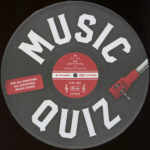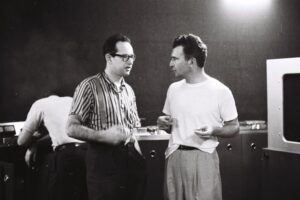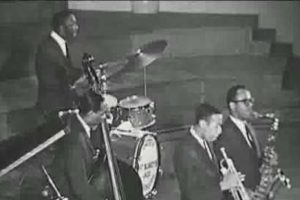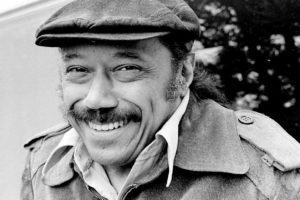For years, Gaetano Alberto “Guy” Lombardo was synonymous with playing Auld Lang Syne on New Year’s Eve. He also was considered a stodgy conservative dance band leader, perhaps just to the cool side of Lawrence Welk.
Our access to YouTube and its documentation of much of the last fifty or sixty years may lead us to forget just how remarkable these videos are. The video above shows Lombardo playing New Year’s Eve 1957/1958 at the Roosevelt Grill in the Roosevelt Hotel in Manhattan. I was about 10 months old and presumably asleep in Queens at the time. About halfway through, the scene shifts to Times Square and correspondent Robert Trout.
I am having a little trouble finding it spelled out explicitly, but apparently these conservative bands that focused on dancing rather than innovative music were call “sweet orchestras.” Muzak, I suppose would be the closest equivalent today, though that’s doesn’t really capture it. Lombardo, however, had fan who wasn’t dismissive, according to the Jazz Research Journal:
Though Guy Lombardo and the Royal Canadians were always considered the sweetest of American dance bands and the antithesis of what is usually called jazz, Louis Armstrong regularly named them as his favorite orchestra. This judgment is usually dismissed as an odd quirk, but by exploring it we can learn something about what made Armstrong unique. Likewise, it is worth examining Armstrong’s admiration for classical virtuosos like Herbert Clarke of the Sousa band. In broader terms, we cannot understand the evolution of jazz if we do not explore the deep African-American classical tradition and the extent to which artists like Armstrong and Lombardo shared a single world, and appealed to a broadly overlapping audience. Sweet orchestras and classical concert music, rather than being the opposite of jazz, were among the many inspirations for Armstrong and his peers, and our understanding and appreciation of these musicians is increased when we realize the breadth of their interests.
That’s sort of like nobody thinking you’re a good basketball player except Michael Jordan. In fact, Lombardo was a pall-bearer at Armstrong’s funeral.
In addition to Auld Lang Syne, the band plays Irving Berlin’s Top Hat, White Tie and Tails.











Recent Comments